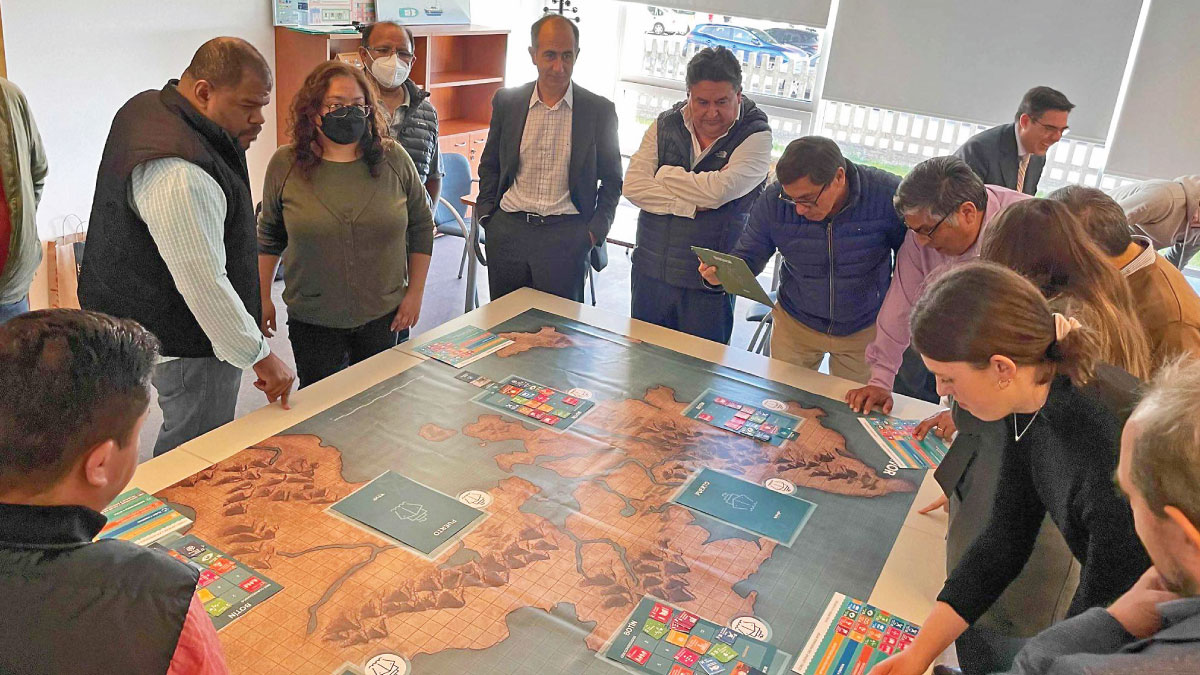UNCTAD tests a new training game that helps port managers to come up with solutions to make their ports more resilient and compliant with the UN Sustainable Development Goals.
Port managers from Latin America exchange knowledge by playing the game during a workshop organized by UNCTAD’s TrainForTrade port management programme in Gijon, Spain. © UNCTAD/Mark Assaf
A new board game dubbed “Port Endeavor” is increasing awareness on the UN Sustainable Development Goals (SDGs) and accelerating their adoption in port communities.
Twenty senior port managers from Latin America exchanged knowledge and experiences by playing the role game during a workshop organized by UNCTAD’s TrainForTrade port management programme from 18 to 29 October in Gijon, Spain.
The game invites players to represent a fictional port with a specific role and objective. They then go through various sustainable activities and challenges as a port team. The activities are selected and paid for by the teams, operating with limited budgets.
During the game, port teams can be affected by occasional disruptive events. Successful activities earn them points under combinations of SDGs.
“The game fosters intense and meaningful exchanges between port managers from different horizons and backgrounds,” said Mark Assaf, who heads the TrainForTrade programme. “It allows them to come up with solutions to make their ports more resilient and compliant with UN SDGs.”
Looking beyond monetary gain
“The focus of the game is not on monetary gain and being the richest port in the end. Players have to decide to spend their limited budgets on sustainable activities,” said Victor Shieh, communications director of the International Association of Ports and Harbours (IAPH), which produced the game under its World Ports Sustainability Programme (WPSP).
The activities and events in the game are based on the WPSP database, which has more than 200 projects and best practices on how ports integrate the SDGs into their business models and operations.
The game was born out of a workshop conducted by UNCTAD and IAPH in Geneva in 2019. Participants from around 30 ports were joined by representatives from academia, financial institutions and shipowners to conduct exercises around the SDGs based on concrete port project examples.
“As a result, we established the SDGs that were most relevant to ports, and that there was a need to support other ports in applying sustainability in their work,” Mr. Shieh said.
The port teams said SDGs 7 (on affordable and clean energy), 8 (on decent work and economic growth) and 9 (on industry, innovation and infrastructure) were the most important ones for them, as well as 11 (on sustainable cities and communities) and 13 (on climate action).
Learning by playing
The launch of the game was delayed by the COVID-19 pandemic and participants at the workshop in Gijon were among the first players to test it in an in-person session.
Esteban Pisani from the Exolgan Container Terminal in Argentina was surprised at the game’s educative power. “Considering our limited economic resources, the game helped us better understand how our decisions impact each of the SDGs,” he said.
He added: “In our daily work, all decisions have consequences, good or bad. Problems arising in the game must be solved and they have a cost. Nothing could explain better how consequential our decisions are.”
Jacqueline Paredes Corrales from Terminal International del Sur in Peru said the game allowed her to tackle many issues that port professionals experience every day.
“When facing disruptive events, we must apply teamwork and make decisions aligned with our corporate strategies and organizational objectives. Ports must develop sustainability plans and base their decisions on the SDGs,” she said.
Ambassadors of the SDGs
UNCTAD’s TrainForTrade programme will continue to develop and use the “Port Endeavor” game in partnership with the IAPH to make port professionals ambassadors of the SDGs.
“Seeing port executives from Latin America being so enthusiastically engaged in playing the game and giving us such positive feedback was very rewarding,” Mr. Shieh said.
Training regional networks of local trainers is an important element of the TrainForTrade programme, helping them tackle the challenges they face while promoting trade and development.
The programme launched in 1989 disseminates international trade-related knowledge and develops skills and capacities in developing countries and those with economies in transition.
Over the years, it has received funding from Belgium, France, Greece, Ireland, Portugal, Spain, the beneficiary countries and partner ports.

